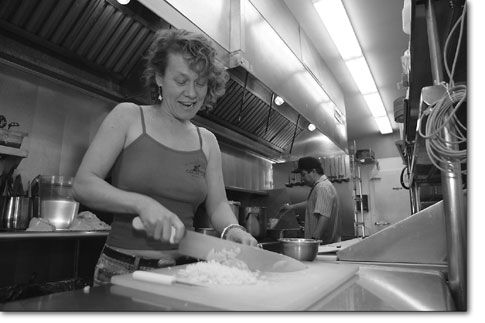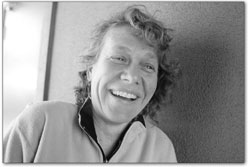| ||||
Travels with Linda
by Shawna Bethell "My father was a Communist; my mother was an Anarchist … When I was growing up, we were never just eight – just my family. We were 12, 16 or 20. There were people from Europe, Australia, all over the world, who came to our house,” recalled Linda Illsley, proprietor of Cocina Linda’s, on her Mexican upbringing. “It was fascinating. As a child, I knew the world was a big exciting place.” Illsley grew up in Uruapan, Mexico, a small conservative community where her blonde hair and blue eyes set her apart. But within the walls of her home, education, experience and opportunity set her even further apart. Employed as a relief worker by the United Nations when it was but a fledgling organization, her father spoke six languages and traveled the world before ultimately settling in Mexico. He was in China when Chiang Kai-shek was overthrown by Mao Tse-tung; he was in Germany to hear Adolph Hitler speak. Her mother lived as an artist in Greenwich Village in New York during the post-McCarthy era. At that time, there was a thriving international artists’ community in Mexico, and she was invited to become part of it. It was here that the two dynamic individuals met and were married, creating a rich and vibrant start to their family. For a living, they made hand-woven fabrics, which they still make today. It was this heritage that gave Illsley a determination of her own to explore the world and follow her passions. This passion led her to Berkeley, Calif., at age 16. “I went to my mother when I was 13 and said I wanted to leave our community,” she said. “It was so small, so conservative, it was driving me crazy. My mother told me when I had finished high school, I could go. I finished by the time I was 16, and I left for the States.” Anyone who has seen Illsley behind the counter of her Durango restaurant can easily imagine her energy and desire to push the boundaries of her world. She never stops moving, talking, cooking and welcoming customers. Her intelligence and dedication to community, to how we all live together in this world, is apparent.
“It is not about money; money is never first,” she says. “It is about people.” In Illsley’s view, we each have a world of our own. Our truth is our own truth, and there is never just any one way to do anything. From our cultures, the places we live and our experiences there, we see events through our own filters, each seeing our own reality. We just need to have an awareness of those filters so our actions are not too damaging to others. It has been through a life of travel and learning that she has come to these conclusions. From Berkeley, Illsley’s passion for cooking lead her to the Culinary Institute of America in New York, where she worked extra jobs and entered “every contest that had money attached” to pay her tuition. Then she landed an apprenticeship in Holland, where she eventually found herself in a room with an angry chef and a pompous restaurateur, fighting for her rights as a woman in a male-dominated field. “I wasn’t going to back down, no way,” she says now, shaking her head and smiling. “I was a bit headstrong back then.” From Holland, she moved to London, via travels throughout Europe. She earned a degree in international relations with an interest in how language, specifically limited definitions of political terms, allow for atrocities against populations. “Take for example the term ‘nation state,’” she says, her blue eyes intent. “By definition, it implies a unit, that people are unified under the same belief system. This does not take into consideration the varying ethnic groups and their varying belief systems. It is an incorrect definition.” She uses the European Union as an example of extremely divergent cultures that acknowledged one another and allowed for a new foundation to emerge. It is something no one would have expected 20 years ago. It is this acceptance of “the other,” this suspension of judgment, that she sees as a catalyst for positive change. Illsley’s plan to earn a graduate degree in the field changed when she learned that her grandmother, her best friend, had been placed in a nursing home in Berkeley. She returned to the States and stayed with her grandmother, advocating for her rights for improved medical care and dignity. She won the battle and was eventually able to take her grandmother back to Mexico to visit her family. When they returned to America, Illsley stayed with her grandmother until she passed. This, as much as any of Illsley’s life experiences, epitomizes her character – caring for and respectful of others. “There are those who are heroes. They are the ones who change the world; the movers and shakers,” she said. “I cannot change the world. I can change me. In the case of my grandmother, I knew she had rights, and I could help change things for her.” Through her travel and study, and by way of her gregarious nature, Illsley has experienced that “big, exciting place” she wanted to explore as a child. But she believes that people everywhere are just trying to make it, with their families, making a living, living life. And she also believes that humans, by nature, are loving, joyful beings. What changes is how we define ourselves and what we choose to nurture within ourselves. “Yes, there is violence, corruption and this horribly unfair war,” she says in closing. “The way to make the change is not to buy into the greed and judgment and fear. At the end of the day, we hope that we have walked so as not to buy into that. That is how we change the world.” •
|
In this week's issue...
- December 18, 2025
- Let it snow
Although ski areas across the West have taken a hit, there’s still hope
- December 18, 2025
- Look, but don't take
Lessons in pottery theft – and remorse – from SW Colorado
- December 11, 2025
- Big plans
Whole Foods, 270 apartments could be coming to Durango Mall parcel



